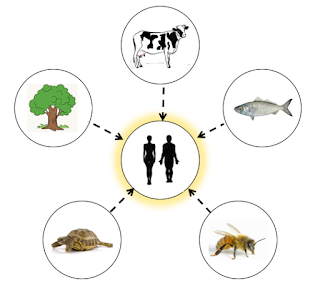Nature going bankrupt : Banks and credit in the "Earth Overshoot Day"
In a previous post, we talked about conceptual metaphors of nature as powerful linguistic devices that are able to communicate and construe the meaning of (1) what nature is, (2) what is the place of humans in nature and (3) what is the human-nature relationship. I have argued that metaphors such as "Nature is a resource" generate worldviews that lead to destroying nature and, by extension, to the current ecological crisis.
In recent years, there has been a growing interest into what is called the "Earth Overshoot Day". In this article I would like to explore which kinds of metaphors of nature are employed in their discourse.
In their website, the Earth Overshoot Day is presented as it "marks the date when humanity’s demand for ecological resources (fish and forests, for instance) and services in a given year exceeds what Earth can regenerate in that year. We maintain this deficit by liquidating stocks of resources and accumulating waste, primarily carbon dioxide in the atmosphere".
The Earth Overshoot Day has gained a lot of visibility in recent years as a way of demonstrating and communicating that modern industrial societies are highly unsustainable, in a manner that is easily understandable through the use of the calendar.
For the year 2019, the Overshoot day is on July 29th, which means that for the remaining 5 months of the year, humans are using ecological resources excessively in relation to what the Earth can regenerate throughout the year.
The Earth Overshoot Day has gained a lot of visibility in recent years as a way of demonstrating and communicating that modern industrial societies are highly unsustainable, in a manner that is easily understandable through the use of the calendar.
For the year 2019, the Overshoot day is on July 29th, which means that for the remaining 5 months of the year, humans are using ecological resources excessively in relation to what the Earth can regenerate throughout the year.
When one looks at how newspapers and media publish and talk about the Overshoot Day, one can notice recurrent phrases such as "humanity lives on credit to Nature" (SBS); "we begin to drain the Earth's savings account" (Business Insider), as well as calculations about "how many planets" would be needed if everybody had the lifestyle of a certain country's citizens.
In the discourse of the Overshoot day, the reference to the metaphor that Nature is a resource, or in this case, that the "Earth is a resource" is overtly explicit. Their discourse portrays the Earth mainly as something that is consumed (or in this case, overconsumed), namely as a stock of resources that are demanded and "liquidated" by humans. Moreover, their discourse portrays fish and forests not as living beings and ecosystems in their own right, but rather as examples of the resources that humans liquidate. Additionally, calculating "how many planets" would be needed if everyone had the lifestyle of a certain country's citizens also portrays our living planet as a consumer good, an object that exists to serve the consumption patterns of humans.
When it comes to assigning the responsibility for the excessive demand of ecological resources, the responsibility is given to a generic and indeterminate subject: "We" and "humanity". These generic subjects lead to representing the issue in a "shared responsibility model" in which all individuals are held equally responsible for this problem. In turn, this leads to overemphasizing individual solutions (Schleppegrell, 1997). I've discussed this in detail in this post.
When it comes to assigning the responsibility for the excessive demand of ecological resources, the responsibility is given to a generic and indeterminate subject: "We" and "humanity". These generic subjects lead to representing the issue in a "shared responsibility model" in which all individuals are held equally responsible for this problem. In turn, this leads to overemphasizing individual solutions (Schleppegrell, 1997). I've discussed this in detail in this post.
Looking carefully into the media uptakes on this, one can identify a new conceptual metaphor of nature, namely the metaphor that "Nature is a bank". The metaphorical relation between nature and a bank appears as one can understand the relationship that humans hold with nature in terms of the relationship one has with a bank. A bank holds a certain amount of money, and it sustains its business through lending money to different people. People, in this way, can get "credit", which is money that they didn't have in the first place, and use it to their will. If people don't return the money (and the interests) to the bank, the latter will eventually go bankrupt.
In a similar way, nature holds a certain stock of resources and humans can use a certain "share of resources" at will. If humans are using more natural resources (money) than what nature (bank) is able to provide in a year, then one can say that "we're all living on credit for the rest of the year" (Euronews). Additionally, since the excessive use of natural resources implies depleting the total stock of resources, one can metaphorically say that the "Earth's savings account is being drained" (the natural resources being money savings).
As you might have noticed, one of the main mappings that make this metaphor functional is that "Nature is money". Yes, you read well, "Nature is money". In this context, we can seriously ask ourselves: How are we ever going to truly care about the Earth if we are conceptualizing it as money and as a bank?
In a similar way, nature holds a certain stock of resources and humans can use a certain "share of resources" at will. If humans are using more natural resources (money) than what nature (bank) is able to provide in a year, then one can say that "we're all living on credit for the rest of the year" (Euronews). Additionally, since the excessive use of natural resources implies depleting the total stock of resources, one can metaphorically say that the "Earth's savings account is being drained" (the natural resources being money savings).
As you might have noticed, one of the main mappings that make this metaphor functional is that "Nature is money". Yes, you read well, "Nature is money". In this context, we can seriously ask ourselves: How are we ever going to truly care about the Earth if we are conceptualizing it as money and as a bank?
In the conceptual metaphor of "Nature is a bank", the relationship between both domains (bank and nature) is not perfect, and for several reasons. For example, industrial societies do not "return" the resources (money) they used from nature (bank). This happens because nature is mainly conceived as a set of exploitable objects, so there is no moral obligation to give anything back. What is given back to nature in reality is trash, poisonous chemicals, plastic waste, air pollution, nuclear waste, among others.
However, if one wants to stick with this metaphor, some interesting questions arise. The first of them is: When is the Earth going bankrupt? and the second (and probably most importantly): What does it actually mean that the Earth is going bankrupt?
However, if one wants to stick with this metaphor, some interesting questions arise. The first of them is: When is the Earth going bankrupt? and the second (and probably most importantly): What does it actually mean that the Earth is going bankrupt?
These crucial questions are never addressed in media that employ this metaphor. For example, we know that if insects "go bankrupt", most complex life (including humans) will not be able to survive. Unfortunately, insects are in a critical state and they continue to be massively exterminated in modern societies (Sánchez-Bayo & Wyckhuys, 2019)
As a conclusion, we examined the conceptual metaphors underlying the discourse expressed by the Earth Overshoot Day, and we identified three main metaphors: "Nature is a resource", "Nature is a bank" and "Nature is money". These metaphors mainly depict nature (or the Earth if you prefer) as something that is supposed to be consumed, which exists only for the benefit of humans. Moreover, conceptualizing nature as a resource, specifically as money, will certainly never create a real sense of attachment and care for the beauty, diversity and vitality of our home planet. These metaphors reproduce anthropocentric worldviews that are at the roots of the ecological crisis and hence they are unable to create a deep willingness to defend nature from current destruction.
As a conclusion, we examined the conceptual metaphors underlying the discourse expressed by the Earth Overshoot Day, and we identified three main metaphors: "Nature is a resource", "Nature is a bank" and "Nature is money". These metaphors mainly depict nature (or the Earth if you prefer) as something that is supposed to be consumed, which exists only for the benefit of humans. Moreover, conceptualizing nature as a resource, specifically as money, will certainly never create a real sense of attachment and care for the beauty, diversity and vitality of our home planet. These metaphors reproduce anthropocentric worldviews that are at the roots of the ecological crisis and hence they are unable to create a deep willingness to defend nature from current destruction.
References
Schleppegrell, M. J. (1997). Agency in environmental education. Linguistics and Education, 9(1), 49-67.
Sánchez-Bayo, F., & Wyckhuys, K. A. (2019). Worldwide decline of the entomofauna: A review of its drivers. Biological conservation, 232, 8-27. link
Schleppegrell, M. J. (1997). Agency in environmental education. Linguistics and Education, 9(1), 49-67.
Sánchez-Bayo, F., & Wyckhuys, K. A. (2019). Worldwide decline of the entomofauna: A review of its drivers. Biological conservation, 232, 8-27. link





Comments
Post a Comment